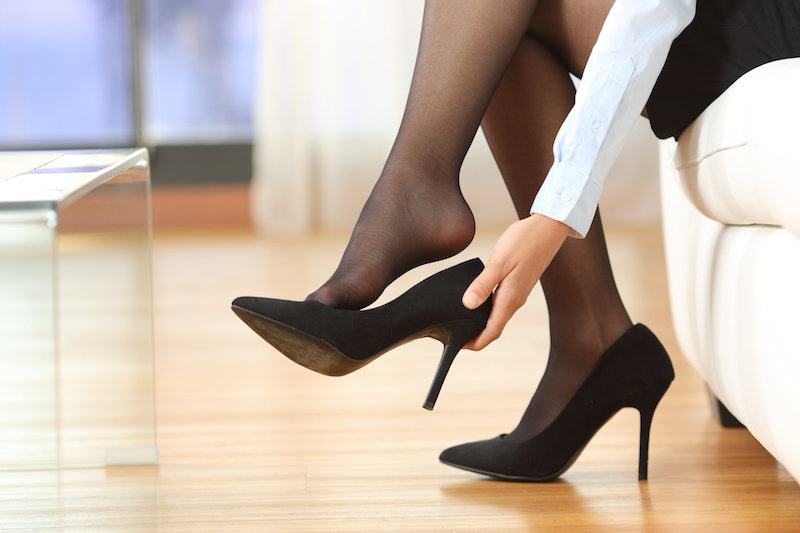
We live in a world that seems out to control every single aspect of how women exist and it's exhausting.
From abortion laws that prevent women from making choices about their own bodies to jobs that demand women to wear high heels at work, we're in a global mess. And yes, you read that right. Japan requires women to wear high heels to work which is clearly a rule made up by a man who has never stepped out in a pair of heels (kitten or stiletto) in his natural-born life. A bozo, if you will. As it goes with most issues that affect women more than men, a Japanese woman created a hashtag movement and petition to ban this requirement by law.
The conversation was sparked after actress Yumi Ishikawa tweeted about her own experience with wearing high heels at work in Japan.
After her tweet received positive feedback from women who endure the same issue, she started a Change.org petition.
"Forced to wear shoes with pumps and heels at work. Aren't there a lot of women who are having a hard time?" reads the translated version of her Change.org post. "I am working part-time job guidance for funerals now. As a rule of employment, it is stipulated to wear pumps with heels. One day, I thought when I got the shoes of a male employee. 'If I use these shoes, I will reduce the burden of work more…"
"#KuToo is a combination of 'shoes', 'pain', '#MeToo',' she explained further.
The #KuToo petition has earned 27,656 signatures at the time of publication.
Ishikawa's goal is 30,000. "In addition to being painful, I would like to say, 'Have you forgotten the Great East Japan Earthquake !?' one supporter commented on the petition. "In Japan, a disaster-prone country, constant wear of pumps and heels can be regarded as life-threatening. Let's erase the manners that harm people and impair safety from this world."
Even non-Japanese women are sharing their experiences working in the country.
"I lived and worked in Japan and this is VERY MUCH REAL," she wrote. "I ran down hallways, bussed tables, cleaned hot springs, did heavy lifting, and stood for 12 hours at a time in heels and a skirt because it was my dress code. #kutoo"
Excuse me? Ran down hallways? Ran?! I can honestly feel the blisters forming on my feet just visualizing this reality. Thanks to this tweet, I now need a foot massage.
People are also REELING at the response from Japan’s health, labor, and welfare minister, Takumi Nemoto, who deemed wearing heels to work "necessary."
“It is socially accepted as something that falls within the realm of being occupationally necessary and appropriate,” Nemoto said during a committee meeting about the matter on Wednesday.
Anyone — whatever gender — reading this who has actually worn high heels for any amount of time already knows this is beyond ridiculous. It's actually inhumane.
One person highlighted that the high heel requirement is a reflection of larger gender inequality issues.
High heel rules are clearly just the tip of the iceberg. The entire world needs to evaluate how it sees women in general. "Yet another example of why Japan is ranked so low on the gender equality index. Extremely misogynistic thinking from the Minister of Health & Labor," the critic wrote.
Women are pointing towards the obvious way to get more Japanese men to see why heels are so terrible to wear to work.
"If high heels are so 'necessary, the men should wear them. Starting with Japan’s Labor Minister. #KuToo," one person shared.
Right on! Actually, let's have Minister Takumi Nemoto slip into the tallest heels on the market and head to work in them. I'll bet all of my savings and my favorite stilettos that he wouldn't even last through the COMMUTE.
Let's hope that Japanese legislation gets turned around.

The high heel requirement merely reflects how little respect our world has for women. It's terrible to force workers of any gender to do their jobs — whether at a desk gig or doing harder labor — in high heels. The rule reveals just how much our society still values women as eye candy as opposed to people who actually bring value to the workplace. The women of Japan deserve so much better than that.




